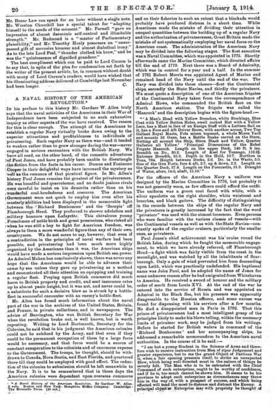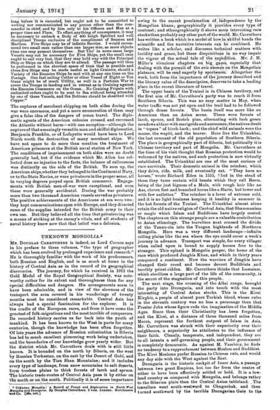• A NAVAL HISTORY OF THE AMERICAN REVOLUTION.*
Ix his preface to this history Mr. Gardner W. Allen truly 'says that the naval activities of the Americans in their War of Independence have been subjected. to no such exhaustive inquiry as other aspects of the war have received. The reason for this is clear enough. The attempt of the Americans to .establish a regular Navy virtually broke down owing to the superior attractions and- profitableness to individuals of privateering. Such regular Navy as there was—and it tended to weaken rather than to grow stronger daring the war—never engaged in serious encounters with the British Navy. We 'have all read, on the other hand, of the romantic adventures !of Paul Jones, and bare probably been unable to disentangle ,the.fiction from the facts in his career. Dumas and Fenimore • t;looper in their delightful ways have increased the mystery as well as the romance of that piratical figure. In Mr. Allen's history Paul Jones remains the greatest of the privateersmen. He was boastful and quarrelsome; and no doubt jealous rivals .were 'careful to insist on his demerits rather than on his ovenderful cool-headedness and resource. The American iGovemunent were not quick to employ him even after his ,:masterlyabilWes,had been displayed in . the memorable fight . between the Richard Bonhomme ' and the 'Serapis ' off Flamborough Head. They preferred to shower adulation and ,military honours upon Lafayette. This chivalrous young ,Frenchman of noble birth and great possessions, who risked all 'whet). be WIIS still a boy to fight for American freedom, was , always to them a more wonderful figure than any of their own countrymen. We do not mean to say, however, that even if coutradiction in the principles of naval warfare had been possible, and privateering had been much more highly ;organized by the Americans than it was, the American ships would have made a serious impression upon British sea-power. As Admiral Mahan has conclusively shown. there was never any hope that the. Americans would be able to advance their cause by sea unless. they gave up privateering as a method and. concentrated all their attention on equipping and training a regular fleet. Preying upon British commerce did much harm to British property 'and. credit, and sent insurance rates up to almost panic height, but it was not, and never could be, a substitute for such a decisive blow as is struck by a battle. fleet in successful encounter with an enemy's battle-fleet.
• Mr. Allen has found much information about the naval .part of the war in the archives of the United States, Britain, and France, in private collections, and. in newspapers. The :advice of Barrington, who was British Secretary for War When the revolution broke out, is well known, but is worth repeating. Writing to Lord Dartmouth, Secretary for the :Colonies, he said that in his judgment the American colonies ;could not be subdued by the Army, and that even if they could be the permanent occupation of them by a large force would be necessary, and that force would be a source of constant exasperation to the colonists and of enormous expense to the Government. The troops, he thought, should be with- 'drawn to Canada, Nova Scotia, and East Florida, and quartered there till they could be employed with good effect. The reduc- tion of the colonies to submission should be left meanwhile to the Navy. It is to be remembered. that in those days the American colonies were dependent upon overseas commerce A Naval History of the America. Resole/ion. By Gardner W. idles. 2 eels- Dodos/ mid Wm. Yo*: Hoeg/doe Mifflin Company. Cm/abridge 'The Riverside Ps.. C89 eetsj and on their fisheries to snob an extent that a blackade would probably have produced distress in a short time. While Americans made the mistake of dividing their attention in unequal quantities- between the building up of a regular Navy and the authorization of privatise rstnen, Great Britain made the mistake of not systematically employing her naval force on the American coast. The administration of the American Navy may be divided into the following stages.' The first executive Waal aNaval Committee, which was appointed in 1775. Shortly afterwards mime the Marine Cora mitMe, which directed affairs till the end. of 1779. Next there was a Board. of Admiralty, Which was in control for a year and a half. In the summer of 1781 Robert Morris was appointed Agent of Marine and remained head of the Navy until the end of the. war, The Navy was divided into three classea—first, the Continental ships, seoondly.the State Navies, and' thirdly the' private'era. We Must quote a description of one of the American frigates of the Continental Navy taken from the correspondence of Admiral Howe, who commanded. the British fleet on the North American station. The frigate was called the 'Hancock' and the description begins with the figure-head :— " A Man's Head with Yellow Breeches, white Stockings, Blue Coat with Yellow Button Holes, small cocked Hat with a Yellow Lace, has a Mast in lieu of an Ensign Staff with a Lateen Sail on it, has a Fore and Aft Driver Boom, with another across, Two Top Gallant Royal Masts, Pole mina topmast, a whole Minn Yard and mounts 92 Guns, has a Rattle Snake carved on the Stern, Netting all around the Ship, Stern Black and Yellow, Quarter Genetics all Yellow.' 'Principal Dimensions of the Rebel Frigate Hancock. Length on the upper Deck, 140 ft. 8 ins. Breadth on Do., 30.2. Length of Keel for Tonnage, 11821. Extreme Breadth, 35.2. Depth in the Hoid, 10.7. Burthen in Tons, 764. Heigth between Decks, 5.6. Do. in the Waste, 5.0. Size of the Gun Ports, fore & aft, 2.7. up & down. 2.2. Length on the Quarter Deck, 57.8. Length on the Forecastle, 3L3. Draught of Water, afore, 14.0, abaft, 15.10.'" For the officers of the American Navy a uniform was designed by the Marine Committee in 1776, but probably it was not generally worn, as few officers could afford the outfit. The uniform was a green coat faced with white, with a silver epaulette on the right shoulder, white waistcoat and breeches, and black gaiters. The difficulty of distinguishing in the records between the ships of the regular Navy and the privateers is greatly increased. by the fact that the word "privateer" was used with the utmost looseness. Even persona who were familiar with the various classes of vessels—with the Continental vessels as well as with the State Navies—con- stantly spoke of the regular cruisers, particularly the smaller ones, as privateers.
Paul Jones's chief achievement was his' cruise round the British Isles, during which he fought the memorable engage- ment, to which we have already referred, off Flam borough Head—a fight which was fairly visible from the coast in the moonlight, and was watched by all the inhabitants of Scar- borough. Only a gale of wind prevented him from descending upon Leith, which was practically undefended. His baptismal name was John Paul, and he adopted the name of Jones for some unknown reason after he had emigrated from Whitehaven to America. He received a sword of honour and the military order of merit from Louis XVL At the end. of the war he entered. into the service of RII3Silt and was appointed an Admiral in the Black Sea, but his presence was apparently disagreeable to the Russian officers, and some excuse was found for dispensing with his services after a few months. He died a disappointed man in Paris in 1792. That this prince of privateersmen had a most intelligent grasp of the principles likely to make his blows telling, within the necessary limits of privateer work, may be judged from his writings. Before he started for British wafers in command- of the 'Richard Bonhomme- and her accompanying ships, he addressed a remarkable memorandum to the American naval authorities. In the course of it he said :— " I am but a young Student in the Science of Arms and there- fore wish to receive instruction from Men of riper Judgezuent and greater experience, but to me the grand Object of Partisan War is, when a fair opening presents itself, to strike an unexpected Blow, which being well directed. must in the nature of things be Beverly felt.. The Man who is to be entrusted with the Chief Command of suc.h enterprises, ought to be worthy of confidence, and if he is, too much cannot be shown him. It seems to be his province to adopt such enterprises as circumstances may throw Item in the way of, with a prospect of success, and which being effected will tend the moat to-distress and, distract the Ettemy. A principal object I* .E. Uterpiissa they with propriety be thought ot long before it is eideuted, but ought' nob to be conimitted to writing nor communieated to any person other than the com- mander in chief, and by . him . only to his' Officers sad Men at a proper time and Rlace, To effect anything of consequence, it may be necessary to embark a Body of WO. heigh Spirited and well disciplined Troops exclusive of the compliment of Seamen and Marines. FiveShips may be oriel:Mite Service. I would recom- mend two small ones rather than one larger size, as more objects than one may present -themselyes. -Bob Tho' in some cases large Vessels may not be necessary for Five Ships, yet the small ones ought to sail very fast, that they may held way with the Principal Ship or Ships on- Which they are to attend. The passage will than be performed in the shortest. space of time that is possible and these.five Ships . may he made useful as light Cruisers, should a Variety of the Enemies Ships ,be met with at any one time on the Passage. One fast sailing'Cutter or other Vessel of Eight or Ten Grum might be Of much Utility, as well in a Partizan War to cover the Troops in landing and in retreat as in Cruising against the Enemies Commerce on the Ocean. , No Cruising Frigate with unlimited order, ought to be sent to Sea without being attended by ona of these V■395e/B, and the Bottoms should be sheathed with Copper."
The captures of merchant shipping on both sides during the war were enormous, and yet a mere enumeration of them may give a false idea of the dangers of ocean traveL The diplo- matic agents of the American colonies crossed and recrossed the Atlantic without harmi-with one exception—although the cant are of that amazingly versatile man and skilful diplomatist, Benjamin Franklin, or of Lafayette would have been to Lord North worth the destruction of many merchant ships: We have not space to do more than mention the treatment of American prisoners at the British naval station of New York. The conditions of imprisonment on both sides were no doubt generally bad, but if the 'evidence which Mr. Alien has col- lected does no injustice to the facts, the balance of callousness was distinctly on the side of the British. To sum up, the American shipawhether they belonged to the Continental Navy, or to the State Navies, or were privateers in the proper sense, all in varying degrees preyed upon British commerce. Engage. ments with British men-of-war were exceptional, and even these were generally accidental. During the war probably more than two thousand American vessels served as privateers. The positive achievements of the Americans at sea were two they kept communicatione open with Europe, and they diverted mime of the supplies intended for the British army to their :own use. But they believed all the time that privateering was a means of striking at the enemy's vitals, and all students of naval history know now that that belief was a delusion.



















































 Previous page
Previous page